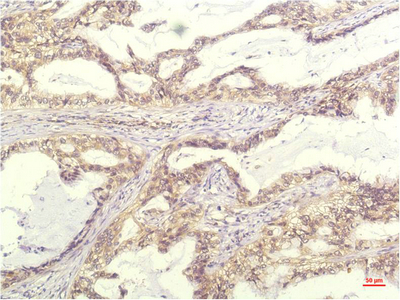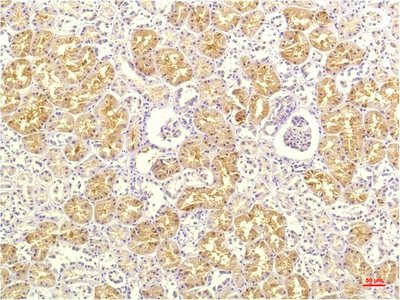IL-8 mouse Monoclonal Antibody(13F8)
- Catalog No.:YM3611
- Applications:IHC;IF
- Reactivity:Human
- Target:
- IL-8
- Fields:
- >>Cytokine-cytokine receptor interaction;>>Viral protein interaction with cytokine and cytokine receptor;>>Chemokine signaling pathway;>>NF-kappa B signaling pathway;>>Phospholipase D signaling pathway;>>Cellular senescence;>>Toll-like receptor signaling pathway;>>NOD-like receptor signaling pathway;>>RIG-I-like receptor signaling pathway;>>IL-17 signaling pathway;>>Non-alcoholic fatty liver disease;>>AGE-RAGE signaling pathway in diabetic complications;>>Alcoholic liver disease;>>Epithelial cell signaling in Helicobacter pylori infection;>>Pathogenic Escherichia coli infection;>>Shigellosis;>>Salmonella infection;>>Pertussis;>>Legionellosis;>>Yersinia infection;>>Chagas disease;>>Malaria;>>Amoebiasis;>>Hepatitis B;>>Human cytomegalovirus infection;>>Influenza A;>>Kaposi sarcoma-associated herpesvirus infection;>>Coronavirus disease - COVID-19;>>Pathways in cancer;>>Transcriptional misregulation in cancer;>>Bladder cancer;>>Rheumatoid arthritis;>>Lipid and atherosclerosis
- Gene Name:
- IL8 CXCL8
- Protein Name:
- IL8
- Human Gene Id:
- 3576
- Human Swiss Prot No:
- P10145
- Immunogen:
- Synthetic C-TERM Peptide of IL-8
- Specificity:
- IL-8 protein detects endogenous levels of IL8
- Formulation:
- Liquid in PBS containing 50% glycerol, 0.5% BSA and 0.02% sodium azide.
- Source:
- Monoclonal, Mouse
- Dilution:
- IHC 1:100-200, IF 1:50-200
- Purification:
- The antibody was affinity-purified from mouse ascites by affinity-chromatography using specific immunogen.
- Concentration:
- 1 mg/ml
- Storage Stability:
- -15°C to -25°C/1 year(Do not lower than -25°C)
- Other Name:
- IL8
- Observed Band(KD):
- 11kD
- Background:
- The protein encoded by this gene is a member of the CXC chemokine family. This chemokine is one of the major mediators of the inflammatory response. This chemokine is secreted by several cell types. It functions as a chemoattractant, and is also a potent angiogenic factor. This gene is believed to play a role in the pathogenesis of bronchiolitis, a common respiratory tract disease caused by viral infection. This gene and other ten members of the CXC chemokine gene family form a chemokine gene cluster in a region mapped to chromosome 4q. [provided by RefSeq, Jul 2008],
- Function:
- function:IL-8 is a chemotactic factor that attracts neutrophils, basophils, and T-cells, but not monocytes. It is also involved in neutrophil activation. It is released from several cell types in response to an inflammatory stimulus. IL-8(6-77) has a 5-10-fold higher activity on neutrophil activation, IL-8(5-77) has increased activity on neutrophil activation and IL-8(7-77) has a higher affinity to receptors CXCR1 and CXCR2 as compared to IL-8(1-77), respectively.,online information:Interleukin-8 entry,PTM:Several N-terminal processed forms are produced by proteolytic cleavage after secretion from at least peripheral blood monocytes, leukcocytes and endothelial cells. In general, IL-8(1-77) is referred to as interleukin-8. IL-8(6-77) is the most promiment form.,similarity:Belongs to the intercrine alpha (chemokine CxC) family.,subunit:Homodimer.,
- Subcellular Location:
- Secreted.
- Expression:
- Chronic myeloid leukemia cell,Kidney,Lung,Lung carcinoma,Neutrophil,Periphe
- June 19-2018
- WESTERN IMMUNOBLOTTING PROTOCOL
- June 19-2018
- IMMUNOHISTOCHEMISTRY-PARAFFIN PROTOCOL
- June 19-2018
- IMMUNOFLUORESCENCE PROTOCOL
- September 08-2020
- FLOW-CYTOMEYRT-PROTOCOL
- May 20-2022
- Cell-Based ELISA│解您多样本WB检测之困扰
- July 13-2018
- CELL-BASED-ELISA-PROTOCOL-FOR-ACETYL-PROTEIN
- July 13-2018
- CELL-BASED-ELISA-PROTOCOL-FOR-PHOSPHO-PROTEIN
- July 13-2018
- Antibody-FAQs
- Products Images

- Immunohistochemical analysis of paraffin-embedded Human Lung Carrcinoma Tissue using IL-8 Mouse mAb diluted at 1:200.

- Immunohistochemical analysis of paraffin-embedded Human Kidney Tissue using IL-8 Mouse mAb diluted at 1:200.



